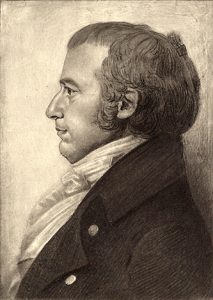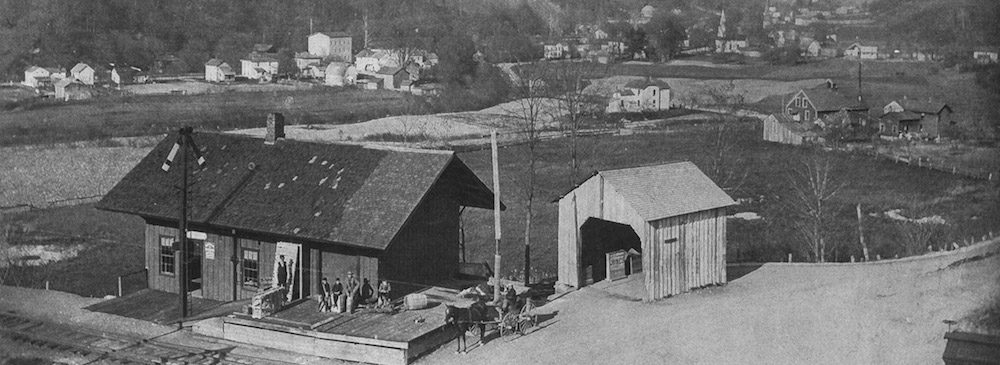Back in June I read an article in the New York Review of Books about the infamous Alien and Sedition Acts of 1798. The article mentioned Robert Goodloe Harper, who supported the act on the grounds that “freedom of the press did not allow ‘sedition and licentiousness’”.
This name tripped a switch in my memory. Before going into that, I’d like to report a bit about Harper, who was prominent in his day, but has now been almost totally forgotten, as is the fate of most prominent people.
Robert Goodloe Harper

Besides his political career, he was a mostly unsuccessful land speculator, while continuing to practice law. According to the History of the American Bar, “The lawyer whose name appears in more cases than any other member of the bar between 1800 and 1825 came from Maryland—Robert Goodloe Harper—able in mercantile cases, a thorough lawyer and a felicitous and graceful orator.”
At the time of his first election to Congress in 1794 he had the reputation of being pro-French. But this changed when he realized that the balance of political power tilted the other way. He became an ardent Federalist, and wrote a book, Observations on the Dispute Between the United States and France attacking France. As his political power increased, he became less tolerant of opposing views. Someone accused him of being the most insolent man in Congress. As an ardently partisan Federalist, it’s no surprise that he supported John Adam’s attempt to repress criticism of his own administration under the Sedition Act.
We can connect Harper to our current political agenda through his concern with the “African-American problem”. He opposed the slave trade and emancipation, favoring instead the creation of overseas colonies as homelands for free African Americans. He helped found the American Colonization Society, influenced the selection of Africa as the site, and came up with the names of the country, Liberia, and its capital, Monrovia. Harper, Liberia, the county’s eleventh largest city, was named after him.
So much for Goodloe Harper. No shame if you haven’t heard of him, but remember that any politically aware citizen of the early nineteenth century would know the name and the man’s reputation, just as we recognize the names of Ted Cruz or Marco Rubio, while also realizing that in 200 years, they will be almost totally forgotten, unless one of them becomes president. They will merit maybe a passing reference in a learned article.
Mary Goodloe Harper Speed
So what was the trigger that made me stop reading the article to consult my notes? Last year St. Thomas Church in Slaterville was a site on one of the Walk and Talk tours organized by the History Center. I helped produce a small pamphlet about the history of the parish and its building. If you’ve never been in St. Thomas you should. It’s an architectural gem. It has many stained glass windows that were donated by members of the parish when the building was constructed in 1893.
 One window was donated by the Speed family, in memory of William P. Speed, (1804–1879). You undoubtedly know about the importance of the Speeds to the early years of our town. Dr. Joseph Speed was one of the early settlers of the town, coming here from Virgina, bringing his slaves with him. Although, "he clearly saw the whole evil of slavery", there's no evidence that he manumitted any of them before the abolition of slavery in New York in 1827. Like Goodloe Harper, he supported the transportation of African Americans back over the Atlantic to a new nation in Africa.
One window was donated by the Speed family, in memory of William P. Speed, (1804–1879). You undoubtedly know about the importance of the Speeds to the early years of our town. Dr. Joseph Speed was one of the early settlers of the town, coming here from Virgina, bringing his slaves with him. Although, "he clearly saw the whole evil of slavery", there's no evidence that he manumitted any of them before the abolition of slavery in New York in 1827. Like Goodloe Harper, he supported the transportation of African Americans back over the Atlantic to a new nation in Africa.
I also have a personal connection. A few years after Suzy and I bought our home on Bailor Road, she began attending services at St. Thomas, where she met Roz Speed, who lived in a house in Slaterville across from what is now the Dandy Mart. Roz had been married to Jack Speed. (Warning: genealogy ahead!)  Jack’s father was Robert Loring Speed, whose father was Robert Goodloe Harper Speed, whose father was James Richard Speed, the son of Dr. Joseph Speed and Mary Goodloe Harper. ("His marriage relationship furnishes one of those beautiful instances of mutual attachment, continuing through a long life, and outliving youth and mere personal attractions, which we read of, but too seldom see.") James Richard Speed had a brother, William, who was the man commemorated in the stained glass window.At the time I was doing this genealogical research, the name Robert Goodloe Harper Speed struck me as unusual, one part too long for a standard American personal name. After I read the article about the Sedition Act, I did more research and discovered that Mary Goodloe Harper, Robert Goodloe Harper Speed’s grandmother, was the sister of Robert Goodloe Harper, the Federalist politician. This explained the puzzling four part name. RGHS was named after his great uncle, 20 years after the latter’s death. An honor to be descended from a famous person, and an honor to be named after him.
Jack’s father was Robert Loring Speed, whose father was Robert Goodloe Harper Speed, whose father was James Richard Speed, the son of Dr. Joseph Speed and Mary Goodloe Harper. ("His marriage relationship furnishes one of those beautiful instances of mutual attachment, continuing through a long life, and outliving youth and mere personal attractions, which we read of, but too seldom see.") James Richard Speed had a brother, William, who was the man commemorated in the stained glass window.At the time I was doing this genealogical research, the name Robert Goodloe Harper Speed struck me as unusual, one part too long for a standard American personal name. After I read the article about the Sedition Act, I did more research and discovered that Mary Goodloe Harper, Robert Goodloe Harper Speed’s grandmother, was the sister of Robert Goodloe Harper, the Federalist politician. This explained the puzzling four part name. RGHS was named after his great uncle, 20 years after the latter’s death. An honor to be descended from a famous person, and an honor to be named after him.
There’s a small addendum to this story. Remember Jack Speed, Roz’s husband? His mother was Mary Louise Bull, the daughter of John Bull, the son of Aaron Bull. The Bulls were another prominent family in the early history of our town, and St. Thomas has a stained glass window given in memory of Moses Bull, another son of Aaron Bull, and Jack Speed’s great uncle. Jack Speed was a descendant of two Slaterville families of historic importance, and was doubly represented by stained glass windows in St. Thomas Church.
Sources
G. Melvin Herndon, Harper, Robert Goodloe, https://www.ncpedia.org/biography/harper-robert-goodloe, 1988.
https://en.wikipedia.org/wiki/Harper,_Liberia
http://www.stthomasslaterville.org/history-of-our
Brenda Wineapple, Our First Authoritarian Crackdown, The New York Review, https://www.nybooks.com/articles/2020/07/02/alien-sedition-acts-authoritarian-crackdown/, 2020.
